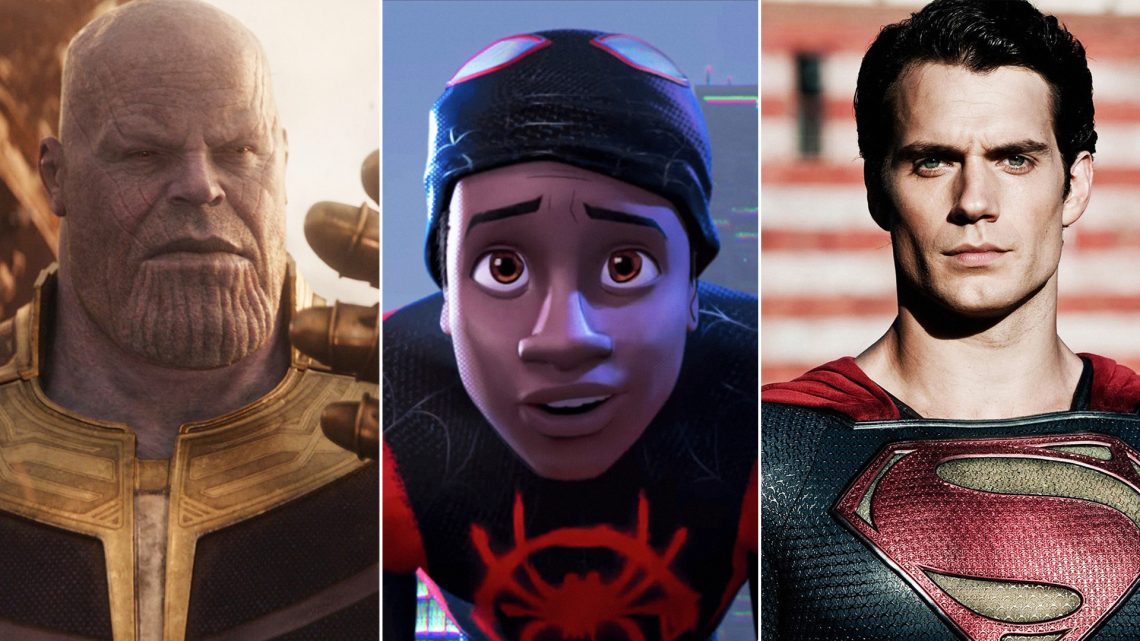
What Superhero Movies Can Learn from ‘Into the Spider-Verse’
December 19, 2018This article originally appeared on VICE Canada.
It’s strange to consider Sony's Into the Spider-Verse as feeling fresh when Spider-Man (as a franchise) feels so old. I’m talking dirt old. Older than the internet old. And old enough to have died and come back 15 fucking times old. He’s a senior citizen with a 56-year history at this point, and consequently, he’s been retelling that same story of spider-bites, dead uncles, and broke hero-ing for years.
Nowadays, when I think of the average superhero movie, it feels like the same kind of old. Whether it’s a current-day, lumpy purplish villain dude going up against six superpowered heroes, energy blasts on energy blasts or 2013’s flying guy #1 up against indestructible alien guy #2 throwing the next through a building thing... it all feels like a retread. But Into the Spider-Verse didn’t feel this way.
Despite being a movie where classic Spider-Man is woven within each plot point, this one sits as a loose comic-book adaptation (by artist Sara Pichelli and writer Brian Michael Bendis) about a young Miles Morales, our new Black/Puerto Rican teenager from Brooklyn, with an affinity for street art. Like Parker, he has his own insecurities, his own radioactive moment, and when some shit goes down involving dimensions, I was given a film brimming with ridiculous heart and an understanding the hero that I love.
Several films both old and new could learn from this fresh take on an old hero. What do you know, I have a list of all the lessons right here:
Into the Spider-Verse understood why fans love the character.
Batman v. Superman could have learned from this.
When I think about the on-screen formulas of the past that worked, they all made correct decisions about who a protagonist was. With Christopher Nolan’s The Dark Knight, he understood that the moodier, and grimmier Batman we all loved was bound to the philosophy of the vigilante; that bleak thinking man driven to bleak varieties of heroism. In contrast, director Patty Jenkins honored Wonder Woman as defiantly hopeful, and optimistic at the risk of drowning in camp. Spider-Verse in this space knows how to celebrate a character beloved for his ground appeal. Miles Morales has a family that he loves, but carries a guilt about receiving a prestigious education off of a charter school lottery. And Peter Parker suffers from depression thanks to insecurities and decisions that impacted his domestic life. As a mythos, Spider-Man has always been adored as a character always on the cusp of greatness, but held back by life.
Zack Snyder’s Batman v. Superman comparatively had no damn clue about Superman. Instead, it did the most to present a terrible Batman impression—gritty, brooding, and dull—when the opposite of Superman was true. While I still can’t stand that inhumanly high moral shit, Superman earned a fanbase because he was an incorruptible ideal. He was a god-like Kansas bumpkin whose morals originated from a normal man (Jonathan Kent). Our superpowered alien vs. rich human aesthetic showcased no clue for why Superman fight Bruce Wayne head on, and vice versa.
Into the Spider-Verse understood humor.
The Amazing Spider-Man 1-2 could have learned from this.
I get it : Sony’s reeling from that Tobey Maguire strut in 2007 so a change was needed. They decided on some counterculture shit. Remove Peter Parker from his four-eyed past, and make him the brooding, always tired, skateboard-riding Andrew Garfield. Yeah, that’ll work. Except it didn’t. Garfield was the most unpleasant Spider-Man that I ever came across, and this is no disrespect to his talent, but a lot of what made the character of Spider-Man beloved was in his ability to laugh and cry at the same time.
Into the Spider-Verse embraces the strut and them some. Miles as a character is clumsy in his spider abilities, and like a pubescent teen amazed by his discoveries, it’s easy to laugh with his growth instead of just at him. There’s consistency to each Spider-Man/Woman that’s both sharp and dissecting of what fans know the Spidey lore. And when it’s removed, dramatic impact is felt.
Into the Spider-Verse understood the “look”
Man of Steel and Batman v. Superman can learn from this.
Thematically, a bad superhero movie will pluck from the superficial bullshit that makes a hero recognizable (power and name), and forget the rest. Man of Steel (2013) ushered in the suit, but introduced dark tones. This was fresh off of the success of The Dark Knight, so naturally director Zack Snyder ignored the bright and poppy color grades of the Superman of 1973, and went with the bleak grading of a 2000ish Batman. I went over the thematic tones that were just wrong with Supes earlier, but by taking it one step further aesthetically, Snyder made stare at the anti-optimism and feel it at the same time.
Compare that to Into the Spider-Verse, which embraces the artful spectrum of a franchised past. Whether it’s Robby Rodriguez and his Gwen Stacy technique, Marvel’s pop-art comic style, or the manga and anime light show, every fucking piece of this movie screams love for who Spider-Man is on a sensory scale. From the yellow caption boxes with internal dialogue (like a strip), to the 2D to 3D implementation, the joyride of being Spider-Man is authentically felt. That’s infectious. (Protip: stay till the end!)
Into the Spider-Verse acknowledges the past.
The Amazing Spider-Man and Spiderman: Homecoming can learn from this.
In the opening sequence, a seasoned twenty-something, halfway depressed Spidey (Chris Pine) begins to monologue out the entire (Sam Raimi) trilogy history: the rain kiss with Mary Jane ( Spider-Man), the halted train ( Spider-Man 2), that restaurant save, and the terrible sidewalk shame ( Spider-Man 3). Between this moment and the next, what starts off as basic montage begins to feel like an insider’s joke. After Spider-Man 3, Sony practically ignored Sam Raimi’s last entry like the red-headed step child it was. And from there, they’ve left us with a cycle of adaptations that either ignored or completely remixed the “classic” elements of the mythos. Homecoming opted for a different Parker who didn’t deal with the jobless, friend-losing, broke of a joke that made Parker who he was. And we’ve spoken about that edgier Spider-Man who doesn’t pay mind to his elders as well. Don’t get me wrong, both of these could have been half decent movies on their own, but they weren’t good “ Spider-Man” movies.
Spider-Verse by comparison throws the self-referential jokes and material at a mile-a-minute. It fully knows that we know about the stories and hiccups by now, and it doesn’t change any of that. What I then felt was a strange bond as a viewer who once invested time and love into this storied past. Whether it was bad or good, it was the experience of every spidey moment that mattered.
Into the Spider-Verse as a theme makes sense.
Avengers: Infinity War could have learned from this.
So what’s the theme of Infinity War? Well, unlike most villains into that ruling the universe shit, we’ve got a purple Hulk impersonator looking to save it. You know his master plan by now; eliminate half of life in the universe or something with the snap of his fingers. Nevermind that power of reality ring he had there that he could have used to fix the problem or whatever—I’ve said this before. The point is, the motivation didn’t make too much sense, and that killed the entire film for me.
Thematically, Into the Spider-Verse shares the same threads as Homecoming. A young guy with the help of a mentor (Iron Man) learns to be a hero of his own, yadda yadda. But with Into the Spider-Verse, the theme is the question: What does it mean to be Spider-Man? It’s answered with a Parker who’s forgotten how to be the hero. It’s answered in Miles who attempts to understand the responsibility. It’s not a Gwen Stacy story, or an any-Parker story, it’s a Spider-Man story. One that my mom (Spider-Man 1976), younger cousin (Sam Raimi, 2002), and I (animated, 1994) will recognize in our differing ways. That’s a theme that’s felt. A celebration of who Spider-Man was, is, and will ultimately become.
Into the Spider-Verse doesn’t give a fuck about its villains.
Doctor Strange can learn from this
I can’t tell you the last time I watched a film where I didn’t give a fuck about the bad dude. There’s something special about that; when a superhero movie chooses not to rely on the villain of the day to move a plot forward. Some of the better MCU films like Guardians of the Galaxy chose to break standard mold by making the Seinfeld-esque team of space misfits the focus. Yes, it’s sacrilege for me to say this when we’ve got Heath Ledger’s Joker, but also consider what happened with the sequel—not as compelling, and therefore a forgettable Batman movie. As far as movies, Doctor Strange is the most recent offender here. Focusing a plot on a weak villain developed in an over-glorified special effect demo. I just couldn’t care for Dr. Strange who felt like a side-character to his own movie.
Sure, Into the Spider-Verse has a standard good-versus-evil plot line (Wilson Fisk fucking up the time continuum), but most of that is pushed to the side for a coming of age story of several coming of age stories. It’s about Parker getting his groove back. It’s about other Spider folks getting home, and it’s about Miles learning about what it means to wear the suit. What’s most important here ends up getting the most shine (as it should), and that’s how you set up a fanboy dude like myself for a sequel. Villains come and go folks, but heroes are here for the long haul.
Sign up for our newsletter to get the best of VICE delivered to your inbox daily.
Follow Noel Ransome on Twitter.


